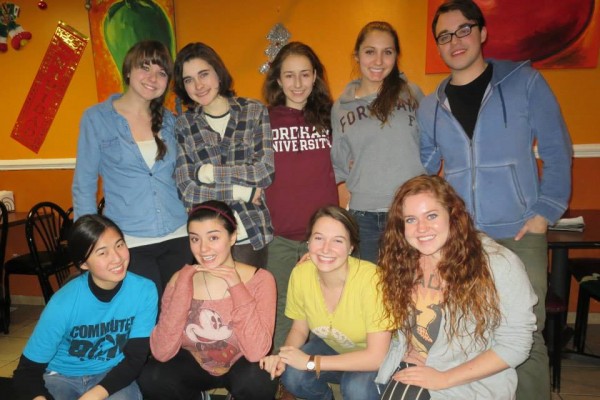My GO! Camden Experience
January 29, 2014

Drug deals, sex trafficking, daily gang shootings and hungry children are some of the daily realities in Camden, N.J. One of America’s most impoverished and crime-ridden cities, Camden is a short drive from Manhattan. I grew up in Mount Laurel, N.J., a predominately white, mostly upper-middle class town, which, compared to Camden, is a suburban paradise only 15 minutes away.
By middle school, the idea that Camden was a dangerous place filled with addicts, gangs and lazy people perpetuating their own problems was ingrained into me. People in my town avoided the city at all costs, with the exception of attending concerts at the Susquehanna Bank Center, one of the few businesses still standing in Camden.
Through Global Outreach, an organization at Fordham dedicated to cultural immersion, service and the pursuit of social justice, my team (led by Hanna Tadevich, Fordham College at Lincoln Center ’15) and I spent a week in this city that was once described by American poetWalt Whitman as “a city invincible.” Today, most would never use this description for a place where, according to the Food Bank of South Jersey, at least one in four children go hungry and the high school graduation rate, according to New Jersey’s Department of Education, was only 49 percent in 2012 compared to Mt. Laurel’s 94 percent.
Our team stayed at the Romero Center, a Catholic social justice education site and urban retreat. We took part in their Urban Challenge: one week of complete immersion. Our schedule consisted of morning prayer (accommodating all faiths), service at various locations and reflection.
One site we visited was the Martin Luther King Jr. Child Development Center, a nonprofit organization funded by state aid and private donations. I spent the day in the infant room, one of three rooms specifically designed for children of various ages. The room is run by Ms. Tish and is about the size of my dorm room.
Despite their visible exhaustion, Ms. Tish and her assistant, Ms. Meme, remained patient and loving toward the children.
“Its hard, but I love these kids. They are my second family,” Ms. Tish said.
Most the staff shared this sentiment. They knew the children’s favorite toys, tickle spots and who needed extra attention to fall asleep at nap time. They knew the youngest baby, Kamar, had to be held all day, that they could count on baby Sage to be happy and calm and that Jullian would wait by the door to escape into the big kid room.
During the kids’ nap time—the only time when staff gets a break—I gazed at the cots and wondered where the children would be in 15 years.
Would they graduate high school or succumb to gang solicitations in desperation to help their families eat? Would they have to wait until tomorrow’s breakfast to eat again? Would they have heat through the bitter winter night? These are Camden’s harsh realities.
For now, these little bundles were warm, dreaming and happy.
New Visions, a day shelter providing three meals and clothing, provided a look at what the future might hold for little Kamar, Sage and Jullian.
Meda, a homeless Camden local, runs the kitchen with an iron fist. She knows most of the visitors by name and has strict rules to ensure everyone receives their fair share. While mingling with the guests, I met three people I will never forget: Tunes, Toot and Eric.
Tunes, on his own since age nine, moved to Camden from Philadelphia in the late 1940s.
“You wouldn’t believe how different it was if I told you,” he kept repeating.
Sherine Green, a Romero Center associate, explained that Camden was a growing industrial city until the mid-1950s. Business outsourcing, suburbanization and the introduction of heroin and crack and cocaine worsened Camden’s reputation.
Tunes said he is proud to be standing. He never got involved in drugs or gangs, although it meant cutting ties with most of his friends who lost their lives to gang violence. Now, out of work due to an injury at his former job, he lives on the streets. Being independent at such a young age meant sacrificing education for work.
Tunes made me promise to stay in school and away from drugs.
Toot and Eric, buddies for years, are two master chess players. In response to every good move I made (they were few compared to Toot), Toot reminded me that he was going easy on me. Eric, my chess mentor and head chef at the shelter, rejected Toot’s “free moves.”
“She doesn’t want nothing for free. Ain’t nothing free in life,” Eric said before carefully explaining each possible opportunity I could take to win.
These are the people of Camden: not asking for hand outs, just opportunities.









